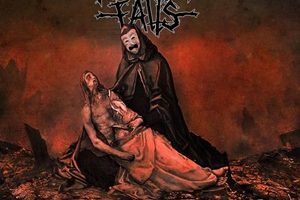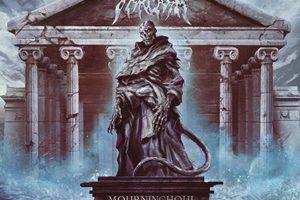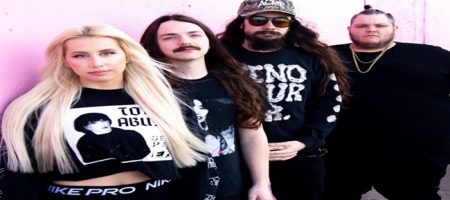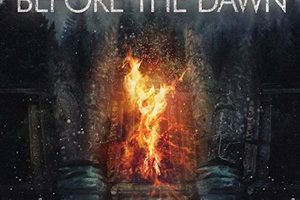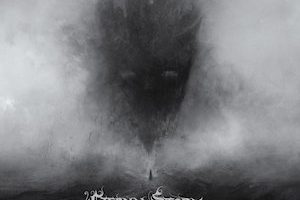Astralborne – Climb Aboard the Fun Train
Tuesday, 1st August 2023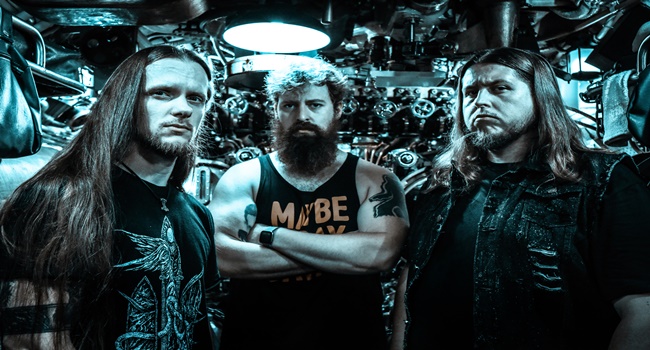
A studio project formed by musicians from New York, Ohio, and Michigan, Astralborne live for a lot of the early melodic death metal influences that originated from Europe during the 1990’s in their style. Their latest album Across the Aeons expands on their Eternity’s End debut, injecting more progressive and acoustic action into their riffs, rhythms, and hooks – creating more of their own niche as a result. We reached out to drummer Jayson Cessna to learn more about the early formation of the group, insights on their two releases, challenges in making things work remotely in different states, memories surrounding In Flames, Dark Tranquillity, Children of Bodom, and Sentenced, plus thoughts on cranking out riffs for the follow-up effort.
Dead Rhetoric: What are some of your earliest memories surrounding music growing up in childhood? At what point did you discover heavier forms of music, and eventually want to pick up an instrument to perform in your own bands?
Jayson Cessna: My earliest memory of heavy music, walking through K-Mart with my grandmother. Remember the boom boxes they used to have on display? It was right in the middle of hearing “Mr. Crowley” from Ozzy, right during the Randy Rhoads solo. I remember being floored, trapped in time listening to that. From that moment on I knew I was into heavier music. I didn’t start drumming until 1999, heavily influenced by Metallica, Slayer, Sepultura, Megadeth. That was a gateway to death metal, and more extreme forms of metal.
Dead Rhetoric: Tell us about the formation of Astralborne in 2018 – did you know straight away the type of melodic death metal style you wanted to go for or was there a feeling out, trial and error process in rehearsals to arrive at what you wanted to achieve in those early days?
Cessna: Well, interestingly enough Astralborne stemmed from… let me give you a little history. The guitarist Derik Smith and I, he and I had a band that started back in 2002 called Forever Lost. We were heavily influenced by melodic death metal; it had a short run and we released one EP. We started to get into other bands, pagan metal/Viking metal with Hammer Horde. At our core, melodic death metal is our biggest influence. When we had the opportunity to do Astralborne, we tapped back into our early sound. We embraced that, and we used some of those old songs as skeletons for what came out afterwards. That was a big intro, our early jams with Derik. Bands we discovered together at an early age when we were seventeen years old, it’s why Astralborne exists. It’s kind of a tribute to that time, those bands, and those influences.
Dead Rhetoric: Eternity’s End is the debut, self-released album for Astralborne – what do you remember most regarding the recording and songwriting sessions, and how do you feel about this effort now having a few years distance from it?
Cessna: When we started Astralborne, the whole idea was just to have fun. That is still the message and our mission statement today. At the time it was a side project, we just wanted to do something cathartic. We were doing Viking metal at the time; we had some riffs that weren’t fitting the mold of that band. We wanted to tap back into the early days, just as a vehicle for those riffs and ideas. We realized, the three of us, we weren’t bogged down by egos, agendas, there was no drama. We were having fun, drinking beer, laughing, the riffs flowed out of us naturally. When Prosthetic Records picked us up, and we signed, we all told ourselves that the minute this stops being fun, we needed to reevaluate this. I’m happy to say, album two is about to be released, and the fun train has not stopped rolling.
Looking back, the album is a little rough around the edges sonically. Astralborne has always been DIY, so there is a learning curve. We used our bassist Paul’s bedroom studio, there was a lot to learn through trial and error. The band has matured since then. One of the biggest differences being, Eternity’s End was more a tribute to melodeath, we weren’t reinventing the wheel. What would In Flames do on this part? What would Dark Tranquillity do on this riff? Whereas on our new album, we think about what would Astralborne do? We are building off the foundation. I look back upon this album fondly, it was a stepping stone to get where we are today. I love those songs; I think they aren’t terribly old yet.
Dead Rhetoric: At what point did you end up signing with Prosthetic Records, and how do you feel about their staff, their roster, and their level of attention that they give to Astralborne?
Cessna: We self-released the debut album in 2019. Prosthetic picked us up, right after we finished our promo campaign for that album. They heard it and re-released the album in 2020. It was great to have it get a second life. Give it another chance to a broader audience, in a broader spectrum. The staff have been great, like-minded. We all have the same goals. With Astralborne being a studio project, we can’t tour. We don’t have a whole lot to give back outside of the music. It’s a risk I’d imagine for a record label, we are not a hot commodity. We make music and they help us put it out, and both parties are happy. They’ve been very supportive compared to the first album. Now that we are in full swing with promotion for album two, it’s good to see they’ve got our back, and we are all pushing things as hard as we can.
Dead Rhetoric: Across the Aeons is the second full-length – another stellar outing for the band. Where do you see the major differences or growth in the band with this record compared to your debut?
Cessna: I think the major differences being, we didn’t feel as trapped in a box. We might have played into some restrictions with the debut album just to capture a certain genre, or subgenre. With Across the Aeons, we tried some things that otherwise might not have fit into that mold. Some songs are more rhythmic, some songs are a little more rhythm guitar heavy, it’s still a busy record. We have a cover song we put in the middle of the album this time as opposed to at the end as a bonus track, which helps tell the story. It’s structured differently. Sonically, the production is better, we captured a better sound on this record.
Dead Rhetoric: The lyrical content pulls from a number of sources within the cosmic universe, fantasy fiction, and your own outlook on humankind. Discuss the importance of intelligent, thought-provoking stories that match the intricacies and moving atmosphere you portray musically – do you believe both aspects are equally important to convey Astralborne’s message in the best ways possible?
Cessna: Great question. We definitely try to delve into fantastical subject matter. Album one Eternity’s End was more about mortality, time, multifaceted with death. Across the Aeons is a little more the examination of the frailty of humankind over the ages. Everything from our need to consume and to conquer, at war with each other, at war with ourselves, the inner turmoil, and we examine our insignificance within the universe itself, which is truly just a speck in the great mass of things. I think it is important for us to embrace the science fiction elements in the songwriting – it coincides with the vibe of the music. At heart, we are just a bunch of nerds, we like that to reflect in the music that is thematic, thought provoking, but maybe not so much on the notes. Then maybe we’ve done our job, but we try to also leave things open ended for interpretation as well.
Dead Rhetoric: Tell us about the video work for “Gemini” and “Nocturneous” – as it seems that the band enjoys employing a storyline/narrative feel to the visual medium that moves beyond the typical videos people normally see these days through social media?
Cessna: As I mentioned earlier, Astralborne is a very do it yourself band. Music videos have a reliance on stock footage that we hadn’t filmed. “Gemini” for instance, we have some car chase scenes which we personally didn’t go out and film, we had access to the stock footage and got the licensing for it. We put it around what we had access to. The three of us are spread out across the states, I’m in central New York, Derik’s in Michigan, Paul is in Ohio – being separated gives us some challenges for getting together and doing music videos. We didn’t want to do something overly ambitious, outside of getting together to do the performance parts. “Nocturneous” we are in that (video) very little. We try to work with what we have and what fits within the lyrics. “Gemini” is more about reincarnation, the thought that there could be another version of yourself in another dimension or another world that makes a connection with you. Through that, we didn’t have a way to convey that, we did something off the cuff that still has a message in and of itself. “Nocturneous” that was written originally about sleep paralysis and night terrors, while researching that I found a poem by H.P. Lovecraft, which tells the story of a tormented author who has these visions that come to him at night, whisk him off into these far away, terrible lands. We tied that to nightmares, with the visuals being that subject matter.
Dead Rhetoric: You chose to cover “December Flower” by In Flames from The Jester’s Race album. What has In Flames meant to you as an artist, which era or albums have had the most impact, and do you believe that your version could possibly turn newer followers onto some of their work?
Cessna: In Flames is one of the godfathers of melodic death metal, and a huge influence of ours. The Jester’s Race is probably our most influential album, we probably wouldn’t be here today if it wasn’t for that album. It was a fitting tribute to them, as to what song to cover. Eternity’s End we did a Judas Priest track, “Hell Patrol”, that was a fun side thing. “December Flower” on the other hand fit the soundscape overall for this record, it made sense to put it where we put it. I look at The Jester’s Race, Whoracle, and Colony as kind of a trilogy. Clayman, I love that record, but I hear some things going off the path a little bit. I always cherish those three records. Our cover, we feel we did justice to the original. It’s just our interpretation, the vocals may be a little bit heavier. It would be awesome for people to be turned on to early In Flames and that catalog. They are still filling the ears of many listeners, but other generations may have slept on the early discography.
Dead Rhetoric: What are some of the biggest challenges currently facing Astralborne in moving up the ranks beyond your local success into national/global success?
Cessna: Astralborne didn’t have too much of a local pulse. We went straight into the studio, released the album, and have never played live. Our style of music may be lost on the folks in our local area. We set out with the idea of not really caring about conquering the local scene. We set our sights higher, national to global, go big or go home. It’s great to be on the Prosthetic label, appeal to a much wider audience. We are getting more attention from people, listeners are liking what they hear, and I can’t help but be grateful for that.
Dead Rhetoric: What would you say are three of the most important albums that helped shape your outlook on melodic death metal – and what’s your favorite concert experience, attending purely as a fan in the audience – plus what made that show so special to you?
Cessna: The Jester’s Race. Our influences are across the map. Hatebreeder by Children of Bodom. That brought in the shreddy guitar element. If you look at classic, melodic death like At the Gates, Gates of Ishtar, Dark Tranquillity, the guitars are very bouncy, riffs. Where Children of Bodom, it’s shred, chock full of solos, put licks in. Last one I would say is Heartwork by Carcass. That taught us that we can be heavy and progressive, without sacrificing complexity, yet still be melodic.
From a live perspective, we were lucky to catch In Flames, Dark Tranquillity, and Sentenced in Detroit many years ago. The show was special because it was the first time Derik got to see In Flames. Seeing all these classic bands, what a bill – you aren’t going to see tours like that anymore. At the end of the In Flames set, they asked everyone in the audience to just get on the stage. Everyone climbed up, jumping up and down with the band.
Dead Rhetoric: How does the band maintain the balance between pursuing your musical goals while also holding down career, relationships, etc.? Are you hopeful to make music a full-time endeavor down the line?
Cessna: I think that’s most musicians’ biggest challenge. We do an okay job. The three of us are all married, I have a child, we are all home owners. We are doing the adulting thing, holding down jobs. At the end of the day, we do try to make music a priority because it’s a huge part of us. We need the release; we need to be able to get it out of us. I don’t think that will ever go away. As far as making a career as career musicians, we probably picked the wrong kind of music to do that. We gave that up as a pipe dream a long time ago. We are happy that we still have the chance to do what we do in this day and age. We are all in our early to mid-40’s, we are not on the road like a lot of these bands. There is a good balance. Thanks to the digital age, we are able to put our products out there. I’m thankful for that.
Dead Rhetoric: What concerns do you have about the world that we are living in today? What do you think the average person needs to spend more time thinking about or taking action on to make the world a better place for all?
Cessna: The world is interesting. I want to blame social media for the climate of today, but I don’t know. I live in a bubble – I use social media mainly to promote the band. People seem divided, opinions are thrown out there without being provoked. It seems weird to see that people are so prepared to defend their opinions, it’s like chill. I would prefer to get back to simpler times, but I don’t think we are on that trajectory. What could I offer? I don’t know, there’s really no answer. We do what we do to have fun. Tell the world to start a band and have fun.
Dead Rhetoric: How do you see the next twelve months or so shaping up for Astralborne as far as activities, promotion?
Cessna: Our plans are to just get right back at the writing process. I know Derik is already plugging away in his little studio room with new riffs. We know that we are slow to making new music, we want to get a jump on it while we can. We will start trading ideas, crafting the skeletons of new songs and see where they go. As far as that’s concerned, that’s the prime objective. As long as there are riffs within us, we are going to be putting them out.











